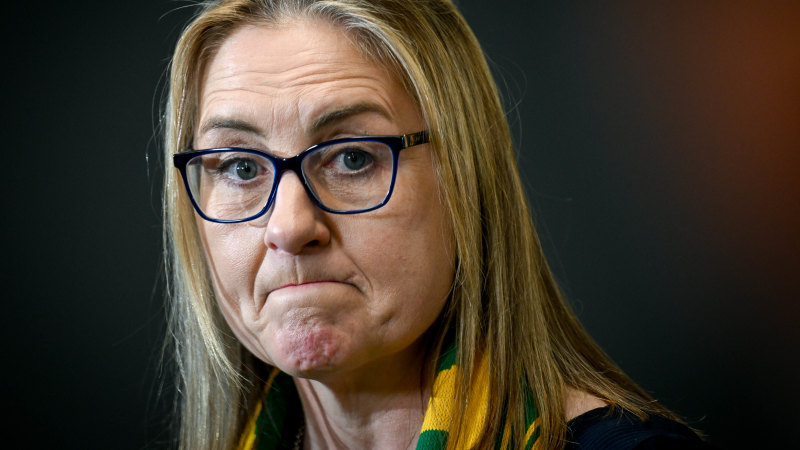Save articles for later
Add articles to your saved list and come back to them any time.
Victoria’s credit rating and budget recovery could be put at risk from further blowouts on major projects, amid uncertainty about the total cost of the Suburban Rail Loop and North East Link.
The warning from a global credit ratings agency comes as the opposition asks for a major audit by the Victorian Auditor-General’s Office of ongoing overruns on state government projects.
A widened Eastern Freeway is part of the North East Link project.Credit: Victorian government
The North East Link’s total cost is now $26.1 billion after further contracts were signed on Friday, up $10 billion from the estimate in its business case. On the same day, an updated budget forecast predicted Victoria’s debt would rise to $177.8 billion by 2027 – a $6.4 billion increase on the forecast in May’s budget.
Responding to the latest figures, S&P’s director of government ratings Anthony Walker said the North East Link’s cost revision was an example of why the agency had lowered the government’s credit rating and its assessments of the state’s financial management.
Victoria has an AA rating with S&P, one of the lowest for any state or territory. These ratings are used to rank how risky it is to lend money to someone. Governments with higher scores can find better rates to borrow at, while lower scores can increase the total cost of loans.
Walker said there was “not a lot” of headroom in the financial projections that would allow Victoria to maintain its rating, and this could be threatened with further blowouts.
“If the government was to broadly deliver what they put in the mid-year budget, it should be … consistent with an AA rating,” Walker said.
“The downside risk is we have seen North East Link already increase by 50 per cent over its final costings.
“While it’s early days for the Suburban Rail Loop, the cost escalations on North East Link show the inherent risks of such major projects. Particularly if you have a look across Australian capital cities, underground tunnelling projects have resulted in a large cost blowout across nearly all projects.
“There’s a lot of debate over the costings of SRL. But given the recent history of nearly every major project in Victoria going well over budget, the risk here is that SRL will follow suit.”
Walker said a major concern was the quality of business cases for projects, with the North East Link the third major project in recent years on which cost increases led to more money being borrowed than originally budgeted.
The Metro Tunnel has risen from $10.9 billion to $14 billion over its construction, while the West Gate Tunnel, once costed at $6.7 billion, is now a $10.8 billion project.
“We have seen business cases come out with positive cost-benefit analysis on the proviso that costs are extremely low. And we have seen costs increase by 50 per cent on major projects already and some of them are growing more than that.That calls into question the use of taxpayers money, whether it’s being used in the most efficient places,” Walker said.
Premier Jacinta Allan on Monday denied the government was overheating the construction market by signing contracts for the North East Link and Suburban Rail Loop amid rising costs.
She said workers would be able to move from the Metro Tunnel and West Gate Tunnel, which required similar skills and were finishing at the same time as the other projects were ramping up.
“One of the things that has an inflationary impact on projects is having a lack of skilled workers available to come and work on those projects,” Allan said.
“That is why having a pipeline of projects like we do here in Victoria means that we’re keeping workers engaged here in Victoria. They can see that they’ve got a pipeline ahead, which means they buy a house or stay here with their family instead of chasing jobs around the country and overseas, and that’s really important.”
Economist Saul Eslake said the ultimate impact of the North East Link blowout would be much bigger than shown in Friday’s budget update, because it would be carried past the government’s forecasts out to 2027. He said by then Victoria would have twice as much debt as NSW, as a percentage of gross state product.
Eslake said over the next four years the state would spend almost $29 billion on interest, but there were chances for improvement as interest rates appeared to have peaked. “One of the sources of the blowout in Victorian government debt and deficits, namely rising interest rates, won’t be as much of a problem,” he said.
In response to the blowouts, the state opposition has written to the Victorian Auditor-General’s Office requesting an immediate audit of all major transport and infrastructure projects announced or under way.
In the letter, seen by this masthead, the Coalition argues the audit is needed because of the unprecedented scale of the cost overruns and their impact on the budget.
It also notes there is still uncertainty about funding for the Suburban Rail Loop. The project’s business case assumes the $34.5 billion first stage will be funded equally between the state, Commonwealth and revenue from the private sector, but only $11 billion has been committed so far.
“We need total transparency so we can get a proper gauge on how financially reckless decision-making inside the Allan government is,” Opposition Leader John Pesutto said.
“Victorians are understandably concerned because they know that financial mismanagement and debt is directly linked to higher taxes and cost of living.”
Get the day’s breaking news, entertainment ideas and a long read to enjoy. Sign up to receive our Evening Edition newsletter here.
Most Viewed in Politics
From our partners
Source: Read Full Article

